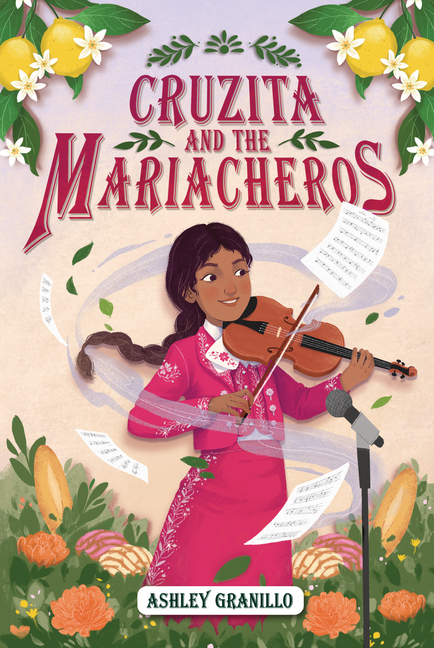From Teaching to Writing

TeachingBooks asks each author or illustrator to reflect on their journey from teaching to writing. Enjoy the following from Ashley Granillo.
On Teaching and Writing
by Ashley Granillo
It may surprise you to hear that, as an author, I hate writing. I have to trick my brain into loving the act of it, especially when it’s mandatory. Never in my life did I think I would become an English major, let alone a writer because the field of English was not on my radar once I was college-bound. In fact, I told my parents that college was a backup plan, and that I would be a singer songwriter, touring with my band. Yet, at the heart of everything I created throughout my life, whether song or art, it all stemmed from my love for storytelling.
For my college freshman composition students, writing is anything but a good time.
I’m not going to stand in front of the class and lie to my students, either. “Writing is fun for you,” one student accuses me of this at least once a semester. For my college freshman composition students, writing is anything but a good time. Over the course of their high school career, they were trained to anticipate the excruciating all-nighters spent chipping away at an essay in MLA format, hopeful it would be perfected before the 11:59 PM deadline. Then, they enroll in my class where most of the hard work is completed in eighty minutes accompanied by games and a curated playlist. Where is the pain they were promised writing came with?
When I was a graduate student, my fiction workshop professor assigned the class a research project about how MFA writing workshops operate in various parts of the country. My findings led to a shocking and sad discovery: the workshop hadn’t changed in twenty years. When I presented my findings to my professor, it became a Socratic standoff as opposed to a seminar. “Well, if you’re going to believe what a book tells you as opposed to experiencing it yourself, then maybe you don’t need this class,” he threatened once I finished presenting my work. I was two weeks away from graduating. I sat down and said, “No, you’re right. What do I know?” This question began my pursuit and obsession with becoming an academic. I had a story to finish.
Lessons are more than projecting the anatomy of an academic essay on a slide or giving a simple formula for a thesis statement.
Teaching itself is an act of storytelling. Lessons are more than projecting the anatomy of an academic essay on a slide or giving a simple formula for a thesis statement. Instead, in my approach students get to learn why I got a B in my freshman composition course, and how I came to discover the thesis formula as a result of my countless failures. To me, this knowledge will be long lasting because at the heart of it, is an origin story––a human who overcame challenges and made it to that deadline and beyond.
On the first day of class, I ask a simple question: who made writing a challenge for you? After five minutes of freewriting, students form two rows and face one another. They have one minute to share their experience before moving down the line and sharing their experience with another new face. By the end of the speed dating experience, everyone has shared that one person who made writing a challenge. Then, I share mine. I often tell the story about how my Contemporary Literature professor made me write a paper four times over, and each time, my grade dropped lower.
Students settle into their seats, ready to scribble away in their designated notebooks. The overhead projector hums with a prompt: write a thesis rhetorically analyzing how a wedding cake tells a stereotypical story of marriage. A few hands go up: what does this have to do with English? I thought we were going to learn how to write about literature.
I then provide a formula to my students that took me ten years to reach on my own. There’s more to my origin story, I label the parts of the thesis. I explain how I learned I was dyslexic when I received my graduate degree. I learned what a thesis finally was when I taught my first English course as a mentee. Also, the first time I gave this lecture on thesis development, a man on my interview panel said he was too distracted by my shoulders showing and the lesson was ineffective.
These stories are not told to demonstrate my resilience, that students have it much better nowadays than I did then. If anything, these stories we tell each other on the first day are meant to humanize the experiences we have as people, not just writers. Together, we can then create a classroom where writing is secondary, and the person and their stories are first.
Books and Resources

TeachingBooks personalizes connections to books and authors. Enjoy the following on Ashley Granillo and the books she’s created.
Listen to Ashley Granillo talking with TeachingBooks about the backstory for Cruzita and the Mariacheros. You can click the player below or experience the recording on TeachingBooks, where you can read along as you listen, and also translate the text to another language.
- Listen to Ashley Granillo’s name pronunciation
- Enjoy the discussion guide for Cruzita and the Mariacheros
- Discover Ashley Granillo’s page and books on TeachingBooks
- Visit Ashley Granillo on her website, X (Twitter), Instagram, Facebook, YouTube, GoodReads, and LinkedIn page
Explore all of the For Teachers, By Teachers blog posts.
Special thanks to Ashley Granillo and Lerner Publishing for their support of this post. All text and images are courtesy of Ashley Granillo and Lerner Publishing and may not be used without expressed written consent.



Leave a Reply